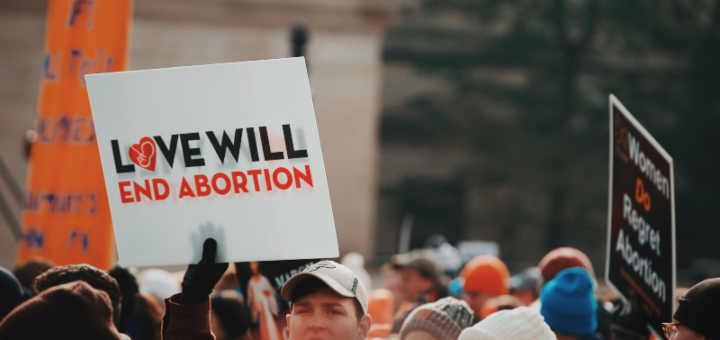
 Image credit: By Nicholas Githiri (2018), Pexels.com, CC0/PD[/caption]
The other day, my five-year-old son was hopping around the Mary garden outside one of our local parishes. He stopped in front of a tombstone tucked into the foliage and slowly sounded out, “For unborn children.” Cocking his head and pointing to the image of Jesus and the Blessed Mother next to the inscription, he questioned, “But Mama, Jesus was born!”
“It’s not for Jesus, honey.”
“Well, who is it for?”
I was taken aback. This particular child prays faithfully and without ceasing “for an end to abortion.” But our family policy regarding difficult, weighty topics is to answer the precise questions that are asked, in the precise moment they are asked. We don’t over-explain or offer too much.
He knows the word “abortion.” He knows what unborn children are. Somehow, he had never connected the two.
I took his hand and we walked. “You know how you pray for an end to abortion every night? It’s for those babies. They didn’t have a chance to be born, and they went back to heaven before they met their mamas and papas.”
He looked at me soberly, understanding dawning.
“You didn’t know exactly what those words meant, did you? Were you praying for that because you heard someone else say it?” I asked gently.
He nodded, a little sheepishly. “So abortion means unborn babies?”
I met his eye evenly. “Yes, honey, it does.”
“Oh.” He considered this for a moment, then let go of my hand and skipped off into the greenery.
I thought about this exchange a lot for the next few days. You can be sure that pro-abortion advocates are sharing with their own children a worldview that leans heavily on words like “choice” and “freedom” and “autonomy.” These positive words glibly coat what we know is, in truth, an unimaginable horror.
We wish to shield our own children from the reality of that horror for as long as possible. But if they are moving in prayerful Catholic circles, they are going to brush up against words like “abortion” and “unborn” by the tender age of five.
And they are going to have questions.
Whether or not you’re planning on attending this month’s pro-life marches in cities around the nation, it’s wiser to prepare than to be caught unaware. Here are three gentle steps, based on Scripture and the Catechism, that you can take to help your children form their consciences around the issue of abortion. Expect the conversation to take a spiral form over many years: a birds-eye view for the youngest questioners, with increasing depth and complexity as they grow older.
Image credit: By Nicholas Githiri (2018), Pexels.com, CC0/PD[/caption]
The other day, my five-year-old son was hopping around the Mary garden outside one of our local parishes. He stopped in front of a tombstone tucked into the foliage and slowly sounded out, “For unborn children.” Cocking his head and pointing to the image of Jesus and the Blessed Mother next to the inscription, he questioned, “But Mama, Jesus was born!”
“It’s not for Jesus, honey.”
“Well, who is it for?”
I was taken aback. This particular child prays faithfully and without ceasing “for an end to abortion.” But our family policy regarding difficult, weighty topics is to answer the precise questions that are asked, in the precise moment they are asked. We don’t over-explain or offer too much.
He knows the word “abortion.” He knows what unborn children are. Somehow, he had never connected the two.
I took his hand and we walked. “You know how you pray for an end to abortion every night? It’s for those babies. They didn’t have a chance to be born, and they went back to heaven before they met their mamas and papas.”
He looked at me soberly, understanding dawning.
“You didn’t know exactly what those words meant, did you? Were you praying for that because you heard someone else say it?” I asked gently.
He nodded, a little sheepishly. “So abortion means unborn babies?”
I met his eye evenly. “Yes, honey, it does.”
“Oh.” He considered this for a moment, then let go of my hand and skipped off into the greenery.
I thought about this exchange a lot for the next few days. You can be sure that pro-abortion advocates are sharing with their own children a worldview that leans heavily on words like “choice” and “freedom” and “autonomy.” These positive words glibly coat what we know is, in truth, an unimaginable horror.
We wish to shield our own children from the reality of that horror for as long as possible. But if they are moving in prayerful Catholic circles, they are going to brush up against words like “abortion” and “unborn” by the tender age of five.
And they are going to have questions.
Whether or not you’re planning on attending this month’s pro-life marches in cities around the nation, it’s wiser to prepare than to be caught unaware. Here are three gentle steps, based on Scripture and the Catechism, that you can take to help your children form their consciences around the issue of abortion. Expect the conversation to take a spiral form over many years: a birds-eye view for the youngest questioners, with increasing depth and complexity as they grow older.
Young Children: Unique and Irreplaceable
You formed my inmost being; you knit me in my mother’s womb. (Psalm 139:13)The deepest desire of the youngest children is to be known and loved. If you begin here, you can’t go far wrong. Spend time talking with your kids about your own pregnancies, and how you prepared for their arrival. Explain that there has never been another one of them in the history of the world, and that, as much as you loved them even before they were born, God loved them more. From there, you can segue into the hard truth that sometimes, moms and dads don’t feel prepared and might even feel scared when they learn a baby is coming. Mary and Joseph certainly did! But remind them that -- no matter what the moms and dads feel -- there has never been another person just like that unborn baby, and God loves each person infinitely. They are unique, irreplaceable, and precious from the very first moments of existence.
Human life is sacred because from its beginning it involves the creative action of God and it remains forever in a special relationship with the Creator, who is its sole end. (Catechism of the Catholic Church 2258)
Older Kids and Tweens: On Human Dignity
“He will answer them, ‘Amen, I say to you, what you did not do for one of these least ones, you did not do for me.'” (Matthew 25:45)School-aged children and tweens are beginning to understand their own power -- and they are capable of great good. They are also keenly interested in the world around them, particularly in issues of fairness and justice. If your kids are like mine, they will naturally point out the places where some people have more than others (particularly if we’re talking about ice cream servings), and how sometimes people don’t make good choices when they feel like they don’t have enough (again, when ice cream is concerned!). Abortion is strongly linked to poverty: feeling trapped often drives pregnant moms to think abortion is the only way out. From there, it’s not a great leap to help your children make the connection that it’s our duty as Christians to help those in need, and moms considering abortion are often in great, crushing need both during and after the pregnancy. The first thing we do to help is encourage them to save their baby’s life. (Back to Step One above: we are each unique, and God loves us all.) But the very next thing must be to offer our support -- logistical, financial, and practical. Donate diapers, clothes, time, and money to your local crisis pregnancy centers, and let your kids help lead that charge.
The duty of making oneself a neighbor to others and actively serving them becomes even more urgent when it involves the disadvantaged, in whatever area this may be. (Catechism of the Catholic Church 1932)
Teens and Young Adults: Means and Ends
Do not return evil for evil, or insult for insult; but, on the contrary, a blessing, because to this you were called, that you might inherit a blessing. (1 Peter 3:9)By the time they are teenagers, your children will have run across some of the stickiest, most complicated arguments people use the defend the necessity of abortion. Cases of rape or incest. Profoundly disabled babies or diagnoses that are “incompatible with life,” to borrow the dehumanizing medical terminology. In all these cases, doesn’t abortion begin to seem like the merciful, if tragic, thing? A timely, controlled end to a messy situation, and some space to grieve and move on without the added complication of another soul to care for? Repeat Steps 1 and 2 above: God loves the babies and the moms alike; we owe a great deal to those in need. People who choose abortion aren’t evil. They are seeking a solution to real problems. These are troubling, emotionally charged arguments. It is good, then, that they can be answered by one very simple moral principle that resonates with even secular pro-lifers: the ends can never justify the means. Even if our intent is to be compassionate, violence cannot coexist with compassion. They are antithetical to each other, contradictory. Even if our intent is to “put an end to suffering,” violence, by its nature, can only compound it. And abortion -- the active dismemberment of a living human being in the earliest stages of development -- is a most profound and abhorrent kind of violence, a choice borne out of deepest suffering. We simply cannot use evil means to get what we want, no matter our motivation. The only palliative for suffering is, and has always been, love.
An evil action cannot be justified by reference to a good intention. (Catechism of the Catholic Church 1759; cf. St. Thomas Aquinas, Dec. praec. 6).
 Image credit: By T. Rampersad (2019), Unsplash.com, CC0/PD[/caption]
What strategies or approaches have you used in talking with your children about abortion at various ages and stages?
Image credit: By T. Rampersad (2019), Unsplash.com, CC0/PD[/caption]
What strategies or approaches have you used in talking with your children about abortion at various ages and stages?
Copyright 2020 Christy Wilkens
About the Author

Christy Wilkens
Christy Wilkens, wife and mother of six, is an armchair philosopher who lives in Austin, TX. She writes at FaithfulNotSuccessful.com about disability, faith, doubt, suffering, community, and good reads. Her first book, Awakening at Lourdes: How an Unanswered Prayer Healed Our Family and Restored Our Faith, a memoir about a pilgrimage with her husband and son, will be released by Ave Maria Press in 2021.


.png?width=1806&height=731&name=CatholicMom_hcfm_logo1_pos_871c_2728c%20(002).png)
Comments